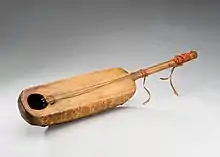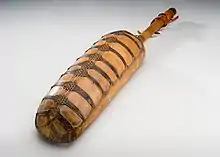Kontigi
A kontigi or kuntigi is a one- or three-stringed African lute.[1] The one string version is used among the Songhai and Djerma.[1] The 3-string version teharden is used among the Tamashek.[1]

Molo, African lute, in the collection of the Smithsonian. The molo is the same or a very similar instrument to the Kontigi, used by a different ethnic group. It does not have the kontigi's metal rings or jingles.

Back of a molo (lute, showing how the skin soundboard is held on)
The instrument is also used in Hausa music, primarily in northern Nigeria and Niger, and among Hausa minorities in Benin, Ghana, Burkina Faso and Cameroon. It is also found among Islamized peoples throughout West Africa (see Xalam). The best-known player of the kontigi is Dan Maraya.
Characteristics
The instrument uses a calabash gourd as the body of the instrument, covered by skin, with a stick for a neck.[1] The neck on the Kontigi has "metal disk surrounded by small rings" which make noise as the instrument is moved or played.[1] The tone is high pitched.[1]
References
- Francis Bebey (1975). African Music A People's Art. Translated by Josephine Bennett. Brooklyn, New York: Lawrence Hill Books. p. 46. ISBN 1-55652-128-6.
This article is issued from Wikipedia. The text is licensed under Creative Commons - Attribution - Sharealike. Additional terms may apply for the media files.
